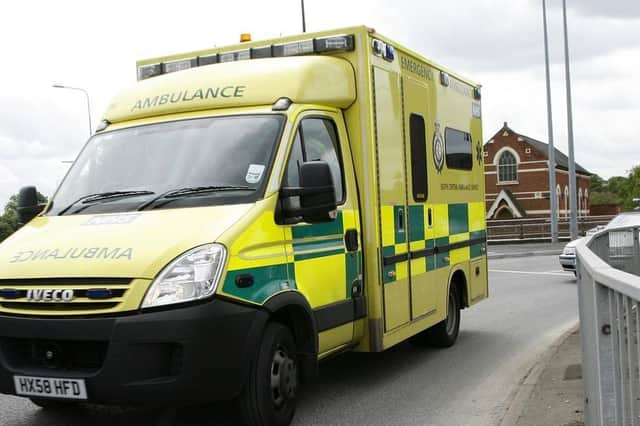Struggling Banbury and Oxfordshire area ambulances are dealing with 'significant' increases in calls to young children with chest infections


Experts believe that because of Covid lockdowns, many children have not been exposed to the virus that causes bronchiolitis which is spreading with the reopening of schools - see article here.
South Central Ambulance Service (SCAS) and the Oxford University Hospitals NHS Trust's (OUH) A&E departments are seeing large increases in demand.
Advertisement
Hide AdAdvertisement
Hide AdThe OUH reported 15,707 attendances at its emergency departments in October with just 69.4 per cent dealt with inside four hours against a target of 95 per cent.
Meanwhile the Royal College of Emergency Medicine has fiercely opposed NHS England's plan to scrap the four-hour targets, fearing it may have a 'a near-catastrophic impact on patient safety in many emergency departments that are already struggling to deliver safe patient care in a wider system that is failing badly'.
SCAS told the Banbury Guardian today (Tuesday) it is under significant pressure and operating at its highest alert level, REAP 4, along with all other ambulance trusts in England.
A spokesman said: "(On Saturday, October 30, (this) led to the declaration of a critical incident due to the level of disruption to the delivery of SCAS services. The Trust remains very busy and has been for some time now and it is clear the busy winter period is going to be more challenging than ever this year.
Advertisement
Hide AdAdvertisement
Hide Ad"Our call centres for both 111 and 999 are experiencing call volumes 50 per cent higher than 2019 and are working under immense pressure every day, while incident demand has been up to 20 per cent higher than 2019 levels.
"We have seen a significant change in demand patterns with more calls during the week and later into the evenings. Demand has increased across all types of conditions, but in particular for those under five where flu and other respiratory conditions have seen a significant increase above the expected levels."
SCAS said it has also seen a significant increase in 111 and 999 calls since May and expects this to continue 'for the foreseeable future'.
"We continue to prioritise those patients with the greatest need and, unfortunately, those who are less poorly will wait longer than we would like," he said.
Advertisement
Hide AdAdvertisement
Hide Ad"We are working well with all of our partners at this very challenging time and ambulance services continue to receive some additional government support along with our local health and care partners to jointly provide the best care we can for all.
"We are urging people to continue to use our services when they need them and that NHS 111 online provides an alternative way to access support 24/7, so it’s important that our local community use this to get signposted to the right place for their health needs.
"We have received additional NHS funding (national ambulance service funding announced a few months ago) and are using this to improve capacity in call centres initially with a huge effort going on to recruit more staff throughout the Trust."
The OUH urged patients to use NHS 111 online in cases that are not emergencies.
Advertisement
Hide AdAdvertisement
Hide AdSara Randall, the Trust's Chief Operational Officer, said: "Our hospitals are still very busy. We would urge the public to help us to help you by choosing the right NHS service because our Emergency Departments at both the John Radcliffe Hospital in Oxford and the Horton General Hospital in Banbury are experiencing high levels of demand.
"Unless it is an emergency, please use the NHS 111 online service which offers patients quick advice on the best option for them to get the care they need, including getting a call back from a trained clinician or nurse, booking them an appointment in an Emergency Department, or providing advice on how to help them recover."